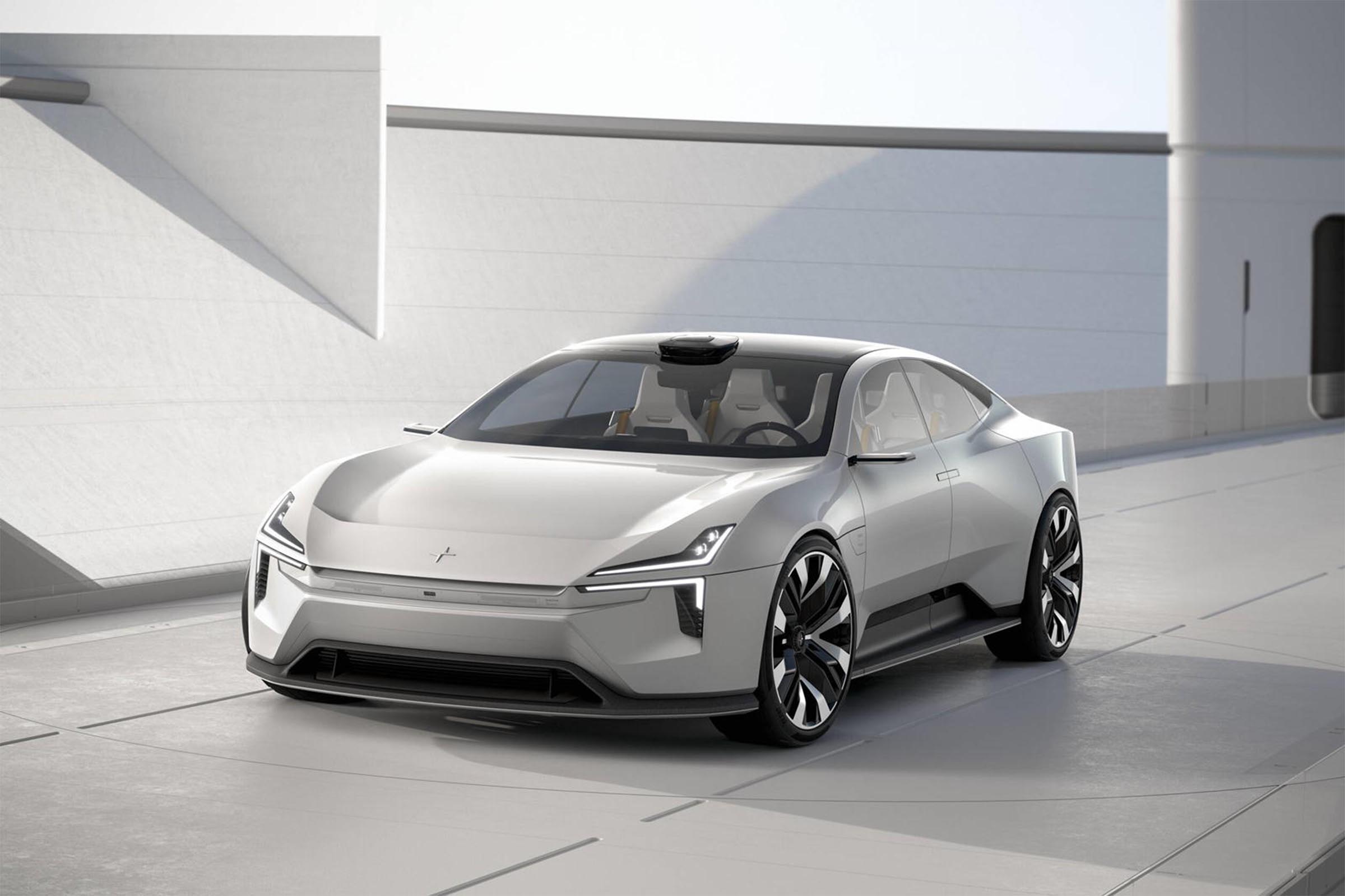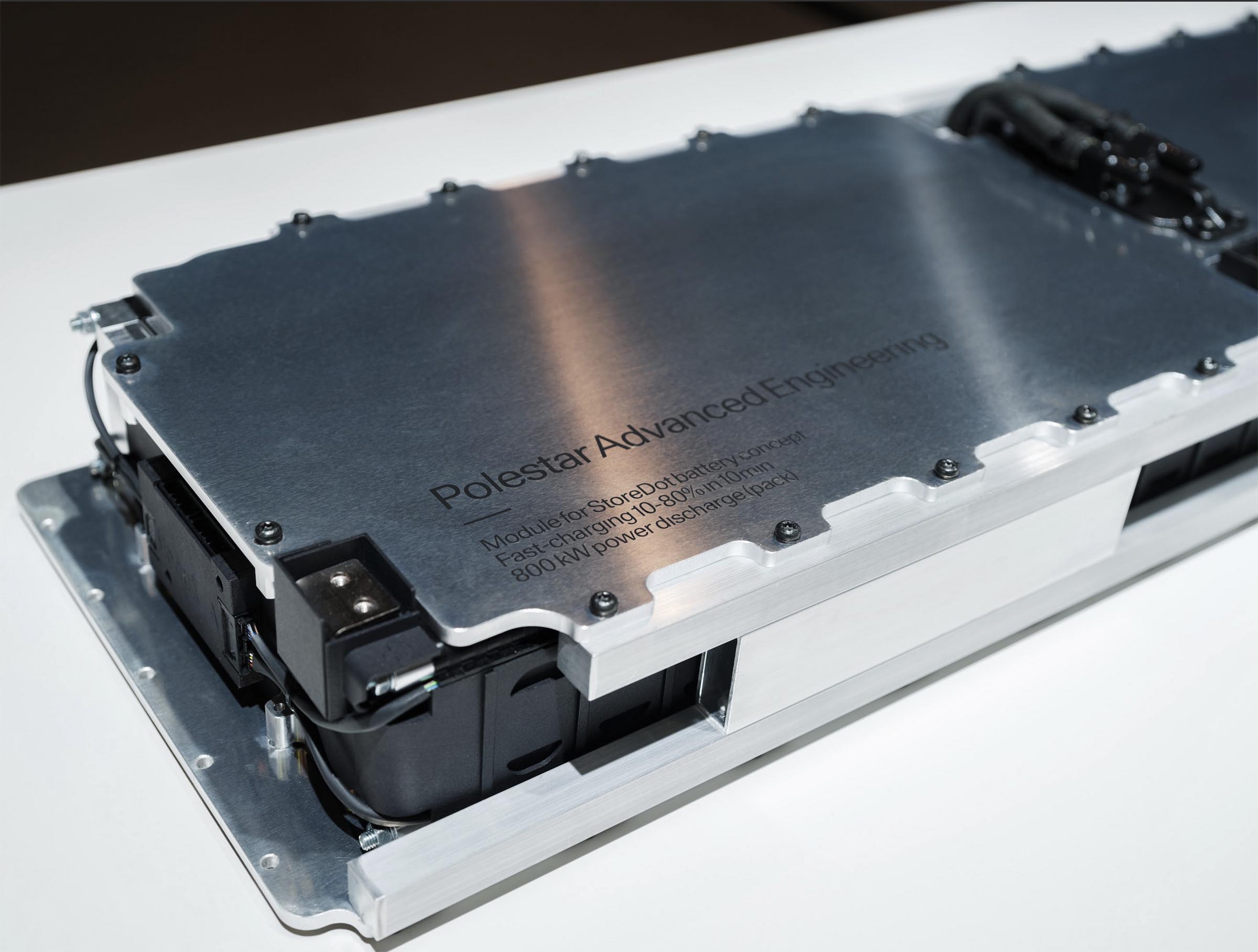Polestar hopes to become the first automaker to adopt a unique new battery design that will address one of the biggest concerns about EVs: their long charging times. Developed by start-up StoreDot, the technology is capable of adding 100 miles of range in just five minutes. And, unlike existing chemistry, StoreDot and Polestar claim repeated fast-charging won’t degrade battery life.
As EVs begin to go mainstream there are a number of issues that threaten to slow widespread public adoption, including not only range but the time it takes to recharge batteries. Working with a high- tech start-up, Polestar hopes it can address both of those issues.
The Volvo spin-off wants to use a new type of battery developed by Israeli-based StoreDot that, the partners claim, offers “100-in-5” capabilities. In other words, they can add as much as 100 miles of range in just five minutes.
At 10 minutes for 200 miles, they’d take only slightly longer to recharge than motorists need to fill up an empty gas tank. By comparison, it can take anywhere up to an hour or more to achieve that with the EVs currently on the road.
A “strong endorsement”
StoreDot’s XFC cells are already being tested by a number of other automakers, including Mercedes-Benz, as well as energy companies like BP, but Polestar is the first to commit to fleet testing the technology by 2024, with a goal of putting it into a production vehicle by 2027. They could be used to power up the Polestar 5, a sleek coupe-like sports sedan based on the Precept concept first revealed in 2020.
A battery offering “the ability to recharge in minutes” could prove a major advantage for his company, Polestar CEO Thomas Ingenlath said during the “Polestar Day” event held in Los Angeles this week.
The announcement comes as a “strong endorsement that the technology is readying for mass production,” said StoreDot CEO Doron Myersdorf.
“We are extremely pleased and proud that Polestar aims to be the first automotive company to showcase our extreme fast charging battery cells in a full-scale, driveable prototype,” he added.
(Polestar switching to NACS charger port, gaining access to Tesla superchargers.)
The race is on
Automakers and suppliers are investing tens of billions of dollars to develop and produce new batteries, with a goal of advancing beyond the limitations of today’s lithium-ion technology. There are a variety of alternatives in the pipeline. Among the most promising are solid-state cells that replace the gels or liquids used today with ceramics or other solids. Proponents claim this approach should yield more powerful batteries delivering longer range at a lower cost, among other features.

The goal is to start testing StoreDot cells in a Polestar prototype by 2024, with a goal of going into production in 2027.
While not fully falling into the solid-state category, StoreDot claims its batteries deliver many of those benefits, as well as rapid charging. They are something of a hybrid, with alternating solid and liquid layers.
StoreDot isn’t the only company working on ways to rapidly recharge batteries, but competitors have run into a variety of problems. Quick charging results in the significant build-up of heat, something that normally degrades batteries, even when used in vehicles with onboard cooling systems. The Israeli firm claims, however, that its technology has shown no degradation after 1,000 charge-discharge cycles.
In a vehicle with a range of at least 300 miles – as Polestar plans to offer with the Polester 5 – that would mean being able to drive a dozen times around the equator without any degradation.
Amping up
To get the maximum benefit from the new chemistry, motorists would need to plug into chargers capable of delivering at least 350 kilowatts of power. Those are becoming increasingly common at public charging stations, however, according to officials with ChargePoint, Electrify America and other companies Headlight.News has spoken to.
Even at lower power levels, however, the StoreDot batteries should be able to charge up faster than existing chemistries, company officials told Headlight.News during a previous interview.
(Shell opens world’s largest charging station. Click Here for more.)
Seeking more money
StoreDot is based in Herzliya, Israel’s equivalent of Silicon Valley. There’s a growing emphasis on automotive research, companies like Ford and Honda operating their own tech centers in that region.
The firm was founded in 2012 and initially focused on powering up smartphones. But it shifted to automotive applications when what was then named Daimler AG made a strategic investment in 2017. All told, StoreDot has now raised $200 million, but it is seeking another $150 million to bring its technology to the commercial level. Adding a production plant could require billions more based on what other battery companies have been spending.
As for Polestar, it started out as a division of Volvo but was spun off to become a separate, EV-focused car brand when the Swedish automaker was acquired by China’s Geely. Like many of the other EV start-ups, Polestar has struggled to build sales. Earlier this week it announced that deliveries will short of expectations, at around 60,000 for all of 2023. It earlier had targeted 80,000. But it believes volumes will grow as it adds more products to the line-up.
EV start-ups, in general, have been having a hard time this year, several expected to fail.






0 Comments
Trackbacks/Pingbacks